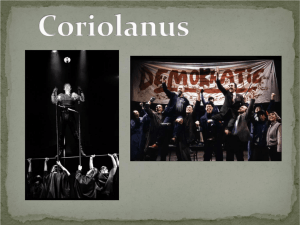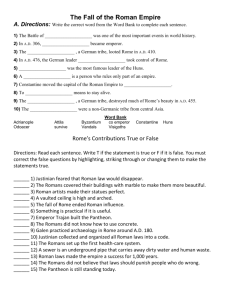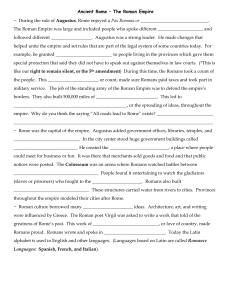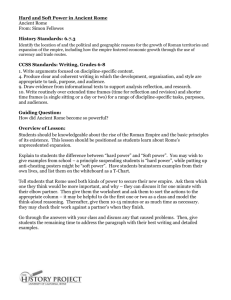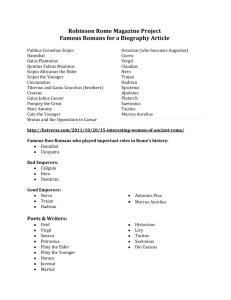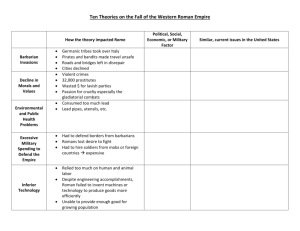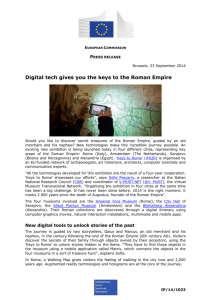Test: Ancient Rome
advertisement
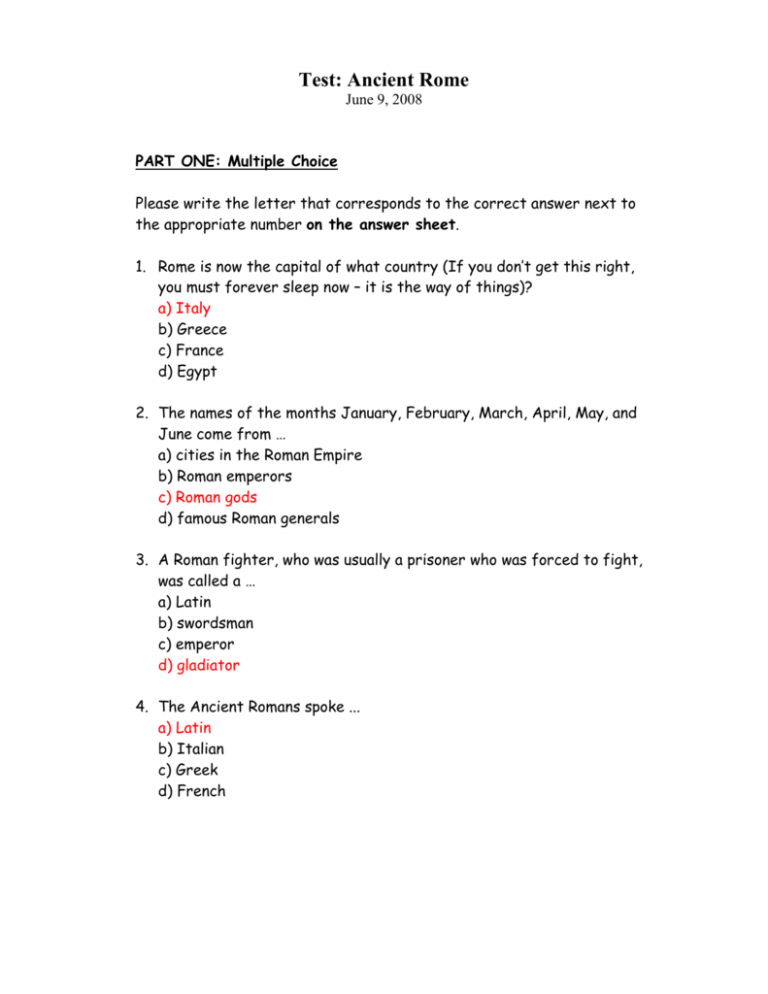
Test: Ancient Rome June 9, 2008 PART ONE: Multiple Choice Please write the letter that corresponds to the correct answer next to the appropriate number on the answer sheet. 1. Rome is now the capital of what country (If you don’t get this right, you must forever sleep now – it is the way of things)? a) Italy b) Greece c) France d) Egypt 2. The names of the months January, February, March, April, May, and June come from … a) cities in the Roman Empire b) Roman emperors c) Roman gods d) famous Roman generals 3. A Roman fighter, who was usually a prisoner who was forced to fight, was called a … a) Latin b) swordsman c) emperor d) gladiator 4. The Ancient Romans spoke ... a) Latin b) Italian c) Greek d) French 5. How did Julius Caesar die? a) Nobles of the Senate stabbed him in the middle of the forum. b) He was stabbed in his garrison tent by one of Pompey’s assassins. c) He was murdered by hired thugs outside the forum. d) He fell from his horse … onto a knife … like …fifty times. 6. Which of these was NOT a popular form of entertainment in Rome? a) chariot races b) gladiator fights c) plays d) bull fights 7. Romulus and Remus … a) were two consuls who saved Rome from the Carthaginians b) were two Roman generals who conquered Gaul c) were twin brothers who were said to have formed the city of Rome 8. In 204 B. C. E Hannibal went to battle on … a) camels b) horses c) mighty war ships d) elephants 9. In 73 B. C. E this slave led a revolt … a) Julius Caesar b) Spartacus c) Hannibal d) Brutus 10. During the Punic Wars the Romans fought… a) each other b) the people of Carthage c) the people of Spain d) the people of Macedonia 11. What happened to Antony and Cleopatra? a) Antony and Cleopatra killed themselves instead of facing defeat. b) Antony and Cleopatra became the first emperors of Rome. c) Antony and Cleopatra joined the two empires of Egypt and Rome. d) Antony and Cleopatra ran away together and started the empire of Gaul. 12. He was the first emperor of the Roman Empire … a) Romulus b) Octavian c) Julius Caesar d) Pompey 13. In the year 117 A.D. a great general named Hadrian became the emperor. He is famous for ... a) making changes in the government. b) defeating Antony in a sea battle off the coast of southwest Greece. c) building a stone wall across northern Britain to keep out barbarian tribes. d) defeating Hannibal at the palace of the King of Bithynia. 14. Around the year 300 C. E. an army general named Diocletian was declared Emperor by his troops. He ... a) lost a large part of the Roman Empire to barbarian tribes. b) cheated the Romans by putting copper instead of gold in the coins. c) appointed two co-emperors, one was in Greece at Byzantium. 15. Rome fell in this year to the army of Alaric. a) 200 C. E. b) 237 C. E. c) 175 B. C. E d) 410 C.E. 16. The modern (1750 – 1960) equivalent of the plebeian class would be … a) slaves b) peasants c) working class d) proletariat 17. Which of the following items did the Romans give us? a) soap b) gasoline c) cement d) the clock 18. An enormous stadium was built to hold the chariot races it was dubbed … a) Super Dome b) Theater c) Colosseum d) Circus Maximus 19. The forum was … a) the marketplace and business center b) Rome's field and track playground c) an amphitheater d) an enormous stadium built to hold the chariot races 20. The Empire’s first (official) declaration of religious tolerance was penned in this city … a) Byzantium b) Nicea c) Milan d) Constantinople PART TWO: True of False Complete directly on answer sheet – circle the “T” if you believe the statement to be true or circle the “F” if you believe the statement to be false. If the statement is false – explain why on your properly labeled looseleaf. 1. The saying “Do ut des” means: “I give so that you might give.” 2. “Pozzolana” is the Italian word for “cement.” Volcanic ash in cement 3. The Romans even had a word for “destroying the tenth,” which was, of course, “decimation”. If you can’t respect their bloodlust you’ve got to at least respect the clerical effort. 4. In 212 CE, Caracalla extended citizenship to all free Roman men throughout the Empire. 5. The Comitia Centuriata was an assembly that consisted of all the enfranchised people (those who had the right to vote) in the city who belonged to tribes. This assembly could pass laws on behalf of all the people. That was the Tributa – the Centuriata was made of 5 groups of male citizens divided by wealth, they voted for the Consuls and discussed laws. 6. Despite many progressive movements throughout the history of the Republic, Rome never really came close to establishing a democracy like the Greeks enjoyed. For the most part, when it wasn’t a dictatorship it was an oligarchy. 7. The reforms of Gaius Marius pretty much guaranteed that those who had swords and skill depended on generals for their livelihood, not Senators. This turned the political tables in favor of the “would-be dictators.” 8. By 34 BCE, The First Triumvirate had dissolved due to Lepidus’ disinterest in Africa and Marc Antony’s keen interest in Queen Cleopatra. These guys were in the SECOND!!! Crassus, Caesar and Pompey were the First Triumverate. 9. One of the first great democratic reforms of the Republic came in the 2nd century BCE when the Senators capitulated to the demands of a violent mob and agreed to elect a pleb representative on an annual basis. The Tribune could pass laws but could not interfere with those decided upon by the Senate. Yes! They could veto the Senate’s bill if they thought it would harm the plebs. 10. Although a blessing to the urban poor, The Land Commission (which the Gracchus brothers paid for with their lives) only further complicated the cyclical problem of land grants. PART THREE: Short Answer Please respond to 2 (TWO) of the following. Write your responses on looseleaf. A. Identify and explain THREE (3) reasons why Christianity spread so quickly throughout the Empire. B. Identify and describe TWO (2) ways that Christianity had a profound impact on the Empire. C. Other than agricultural development, identify and describe TWO (2) key factors that contributed to the early Republic’s expansion. D. Identify and describe TWO (2) “democratic” reforms made during the time of the Republic. E. Identify and describe TWO (2) causes of the Western Empire’s collapse, offer an explanation as to why these were the two most important factors. F. Identify and describe THREE (3) of Octavius’ accomplishments before or after he declared himself Caesar Augustus. PART FOUR: Analysis You will find three figures attached to this test – three different depictions of the Visigoth King, Alaric. Analyze TWO (2) of them for “limitation” and “purpose”. All work for this section is to be completed on loose-leaf.


